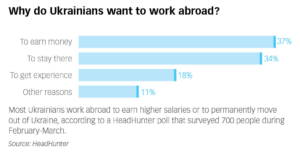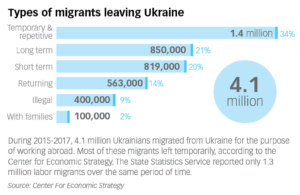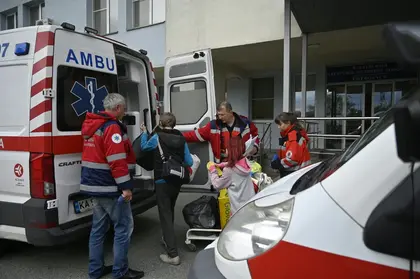EDMONTON, Canada — Ukraine keeps losing young and talented people: every month some 100,000 Ukrainians become labor migrants, according to Ukrainian Foreign Minister Pavlo Klimkin.
Endemic corruption, Russia’s war in eastern Ukraine and the impact on Ukraine of the global economic crisis have made the perennial flow of emigrants even more pronounced over the last four years.
While many head to European countries — especially those within the Schengen zone, which since 2017 has welcomed Ukrainians for short-term trips without a visa — there are others who prefer destinations further away.
Canada has been on the radar of many talented Ukrainians for decades: the country has seen five waves of Ukrainian immigrants over the past 125 years, there are now 1.4 million ethnic Ukrainians living in Canada. They constitute 4 percent of Canada’s 35-million population.
The number of Ukrainians in Canada grows every year. According to the latest available census information, nearly 24,000 new permanent residents from Ukraine landed in Canada between 2006 and 2015.
Mykyta Gulenko is one of them: He left Kyiv and moved to the province of British Columbia in western Canada in 2013. He currently resides in Edmonton, Alberta where he works as Northeast Area Telecom Team Lead at Alberta Agriculture and Forestry Division. He said he couldn’t see himself living and doing business in Ukraine under the regime of President Viktor Yanukovych, who ruled from 2010 until the EuroMaidan Revolution ousted him on Feb. 22, 2014.
Even though Yanukovych is gone, Gulenko never regretted his decision to leave.
Starting anew wasn’t easy. Even though he had the qualifications for the job and a degree in telecommunications engineering from the Kyiv Military Institute of Control and Communications and Kyiv Polytechnic University, he started with an entry-level position and worked his way up to the manager’s role.

He says that all the immigrants need to be prepared to work in positions lower than they are used to at home.
“Then it all changes as one gains local experience,” he explains.
Gulenko acknowledges there’s a problem with brain drain in Ukraine.
To respond to it, he says, salaries need to be increased as a first step, and employers need to rethink their approach.
“This thing ‘I’m a boss, you’re an employee and thus a fool’ needs to stop,” Gulenko said.
“Many people (in Ukraine) are fired just because of bad managers. This is very rare here (in Canada).”
Stay or go
The top reason for human capital flight is Ukraine’s low salaries.
Ukraine’s official average wage is nearly $4,000 a year. This makes any developed country a more attractive option for Ukrainians.
But even those with good income often decide to leave when a chance emerges.
Anastasiia Bugaienko has been living in Canada for three-and-a-half years. She says her decision to leave Ukraine was “a deliberated and mature choice.”
“I’d wanted to emigrate since 2011, but I didn’t have enough resources and internal strength to act on my plan,” she explains.
Bugaienko worked in one of Kyiv’s banks in a management position and says she “lived a decent life.” She could afford to travel and her purchasing power was above average.
But Ukraine’s problems outweighed these comforts: Among the key reasons she names are negative information in the media, burdening bureaucracy, and corruption at all levels of the government.
“All of that caused a lot of anxiety and desire to depart even without full understanding of the challenges I would face abroad,” Bugaienko told the Kyiv Post.
Her path to landing a decent job overseas was hard, as she had visa restrictions in the beginning and couldn’t work full-time. After four months of searching, she got her first job in a museum, a seasonal one.
Now Bugaienko is busy at her third job, at Canada’s Revenue Agency. She’s constantly taking courses to improve her knowledge as she admits it’s “tough to successfully get through a job interview here.”
However, it pays: In 2017, the average wage in Canada was $51,000 a year. The minimum wage varied between 10–14 Canadian dollars (U.S. $7–11) per hour.
Bugaienko recalled that while interviewing, “HR are assessing not only working knowledge, but also estimates the candidates’ ability to handle conflict in a workplace and how the new employee will fit in an organization.”

She enjoys working under Canadian employers.
“What I loved about Canadian employers that in every position they provide training/orientation necessary for the employee to successfully fulfill duties,” she says.
“Self-studying and self-motivation are also very important, but you don’t find yourself in a limbo.”
Bugaienko says she misses Kyiv with its historical places and favorite spots, but after living in Canada for more than three years she feels that she “belongs here.”
Finding a cure
To staunch the brain drain, Ukraine should consider a number of options, says Oleksandr Romanko, a senior research analyst at Watson Financial Services division of IBM Canada and adjunct professor at the University of Toronto.
Romanko himself has been living in Canada for 14 years after he came to do his Master’s degree in Computer Science at McMaster University in Hamilton, Canada. Later during his Ph.D. studies, he took two four-month research internships at Algorithmics Inc. in Toronto, a company that creates financial and risk analysis software and services for banks, insurance companies and other financial institutions, which was acquired by IBM in 2011.
After graduating, he joined IBM full-time, working on R&D projects at Watson Financial Services division.
According to Romanko, Ukraine has to create incentives for people to stay and work in the country and motivate people who left Ukraine to come back, as well as to engage people who would not come back to stay engaged with Ukraine via doing voluntary work for the country.
“Countries that understand that and create incentives for people to ‘come back’ are winning the ‘brain drain’ race now,” Romanko told the Kyiv Post. “And ‘coming back’ should be understood in the broadest sense. For instance, for a professor who left Ukraine and became a professor at University of Toronto ‘coming back’ can be teaching a course at a Ukrainian university once a year during his or her vacation.”
During his vacations in Ukraine, Romanko teaches the Master of Data Science program at Ukrainian Catholic University in Lviv. This year he’s involved in the opening of Master of Business and Management in Artificial Intelligence and Data Analytics program at Kyiv School of Economics in Kyiv.
Research and development at companies, collaborations between companies and universities, and innovation are slowly taking place in Ukraine, but at a much slower rate than in Canada, according to Romanko.
“Helping Ukrainian companies and universities to innovate is part of our volunteering efforts,” he says.
“This year we managed to convince the Canadian Government to allow Ukraine to join Canada’s Mitacs Globalink Research Internship program, which allowed 50 Ukrainian students to do three-month research internships at Canadian universities.”
You can also highlight the text and press Ctrl + Enter







Comments (0)